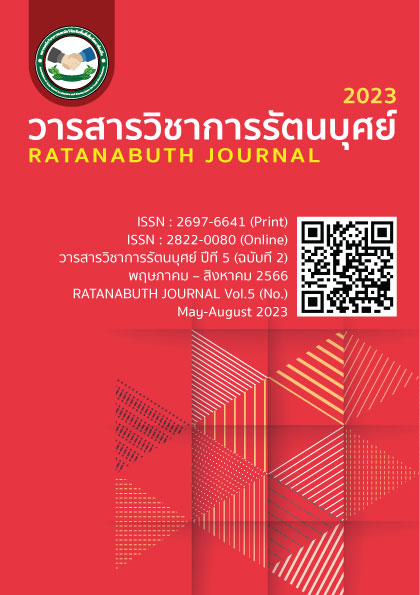The Development Guidelines for Teacher in Creative Learning Management for Schools under the Maha Sarakham Primary Education Service Area Office 3 The Development Guidelines for Teacher in Creative Learning Management for Schools under the Maha Sarakham Primary Education Service Area Office 3
Main Article Content
Abstract
The purposes of this research were to 1) study the current and the desirable state of developing for teacher in creative learning management for schools under the Maha Sarakham primary education service area office 3. 2) study the development guidelines for teacher in creative learning management for schools under the The Maha Sarakham primary education service area office 3. The research process was divided to 2 phases: Phase 1 ; to study the current and the desirable state of developing for teacher in creative learning management. The sample group used in the research was administrators and teachers, 278 people, by stratified sampling. The research tool was a questionnaire, confidence of the whole .78. The statistics used for data analysis were mean, standard deviation. Phase 2; to study the development guidelines for teacher in creative learning management for schools under the Maha Sarakham primary education service area office 3. The target group is 7 experts. The research tool was interview form, Data analysis by content analysis.
The research results were found that
- The current state in overall was high average and the desirable state in overall was in the highest level. The priority need rank from high to low level was 1) Promoting creative processes 2) learning management for learner's nature, potential and needs of learners 3) learning management for practice and experience.
- Guidelines for teacher development in creative learning management Include, 1) Promoting creative processes, 2 guidelines 2)learning management for learner's nature, potential and needs of learners, 2 guidelines 3)learning management for practice and experience, 2 guidelines
Article Details

This work is licensed under a Creative Commons Attribution-NonCommercial-NoDerivatives 4.0 International License.
References
กรัณย์พล วิวรรธมงคล.(2561). รูปแบบการพัฒนาครูโดยใช้กระบวนการชุมชนการเรียนรู้ทางวิชาชีพเพื่อส่งเสริม ความสามารถจัดการเรียนรู้ตามแนวสะเต็มศึกษาในระดับการศึกษาขั้นพื้นฐาน.วารสารมหาวิทยาลัยศิลปากร สาขามนุษยศาสตร์ สังคมศาสตร์และศิลปะ. 11(3), 92-114.
คุณากร วาณิชย์พันธ์.(2552). เศรษฐศาสตร์สร้างสรรค์ The Creative Economy. กรุงเทพฯ : ศูนย์สร้างสรรค์งานออกแบบ.
บุญชม ศรีสะอาด.(2556). การวิจัยเบื้องต้น. (พิมพ์ครั้งที่ 9). กรุงเทพฯ: สุวีริยาสาส์น.
ไพฑูรย์ สินลารัตน์. (2558). ปรัชญาการศึกษาเชิงสร้างสรรค์และผลิตภาพ. กรุงเทพฯ : โรงพิมพ์แห่งจุฬาลงกรณ์มหาวิทยาลัย.
วิชัย วงษ์ใหญ่ และมารุต พัฒนผล. (2563). การเรียนรู้เชิงสร้างสรรค์ (Creative Learning). กรุงเทพฯ : จรัลสนิทวงศ์การพิมพ์.
วิชัย วงษ์ใหญ่ และมารุต พัฒนผล. (2564). การเรียนรู้เชิงสร้างสรรค์ (Creative Learning). พิมพ์ครั้งที่ 2. กรุงเทพฯ : จรัลสนิทวงศ์การพิมพ์.
สำนักงานคณะกรรมการการศึกษาขั้นพื้นฐาน. (2560). โครงการวิจัยและพัฒนาการจัดการเรียนรู้แบบสร้างสรรค์เป็นฐาน. กรุงเทพฯ: สำนักพัฒนานวัตกรรมการจัดการศึกษา สำนักงานคณะกรรมการการศึกษาขั้นพื้นฐาน.
สำนักงานบริหารงานมัธยมศึกษาตอนปลาย. (2560). การขับเคลื่อนการศึกษามัธยมศึกษาไทย 4.0 เพื่อการมีงานทำแห่งศตวรรษที่ 21. กรุงเทพฯ : โรงพิมพ์ชุมนุมสหกรณ์การเกษตรแห่งประเทศไทย.
สำนักงานเลขาธิการสภาการศึกษา. (2560). สภาวะการศึกษาไทยปี 2559/2560 แนวทางการปฏิรูปการศึกษาไทยเพื่อก้าวสู่ยุค Thailand 4.0. กรุงเทพฯ : สำนักงานเลขาธิการสภาการศึกษา.
สำนักงานเลขาธิการสภาการศึกษา. (2561). รายงานการศึกษาไทย พ.ศ. 2561. กรุงเทพฯ : พริกหวานกราฟฟิค.
Cronbach, L. J. (1970). Essentials of Psychological Testing. New York: Harper & Row.
Education Week Research Center. (2016). Mindset in the Classroom: A National Study of K-12 Teachers. Bethesda, MD: Editorial Projects in Education Inc.
DeMonte, Jenny. (2013). High–Quality Professional Development for Teachers: Supporting Teacher Training to Improve Student Learning. Washington D.C. Center for American Progress.
Krejcie, R. V. & Morgan, D. W. (1970). Determining Sample Size for Research Activities. Educational and Psychological Measurement.
Schoology Exchange. (2020). Digital Learning: What to Know in 2020. Retrieved from https://www.schoology.com/blog/ digital-learning.


